Mehedi Hasan wants to show me the solar panel he installed on his parents' house four years ago, two years before the village had electricity. But he stops at the top of the ladder: “It's too unsafe for me to go up on the roof,” he says, pointing to the rust that has eaten into the corrugated iron roof. “That's because the humid air here is so salty,” explains his father Mahabub Hawlader, who is watching the scene.
We are in Nishanbaria in southwestern Bangladesh. This is where 26-year-old Mehedi lives with his wife and parents. The fact that the air in this area is salty has to do with the soil: It is full of salt.
Global warming is to blame. It causes the rivers in Bangladesh to have less and less water during the eight-month dry season, while at the same time sea levels are rising. As a result, seawater pushes back the river water and flows deeper and deeper inland. It eventually reaches the fields via the highly complex irrigation system. The result: Entire swathes of land in the once very fertile south of Bangladesh can no longer be used for agriculture.
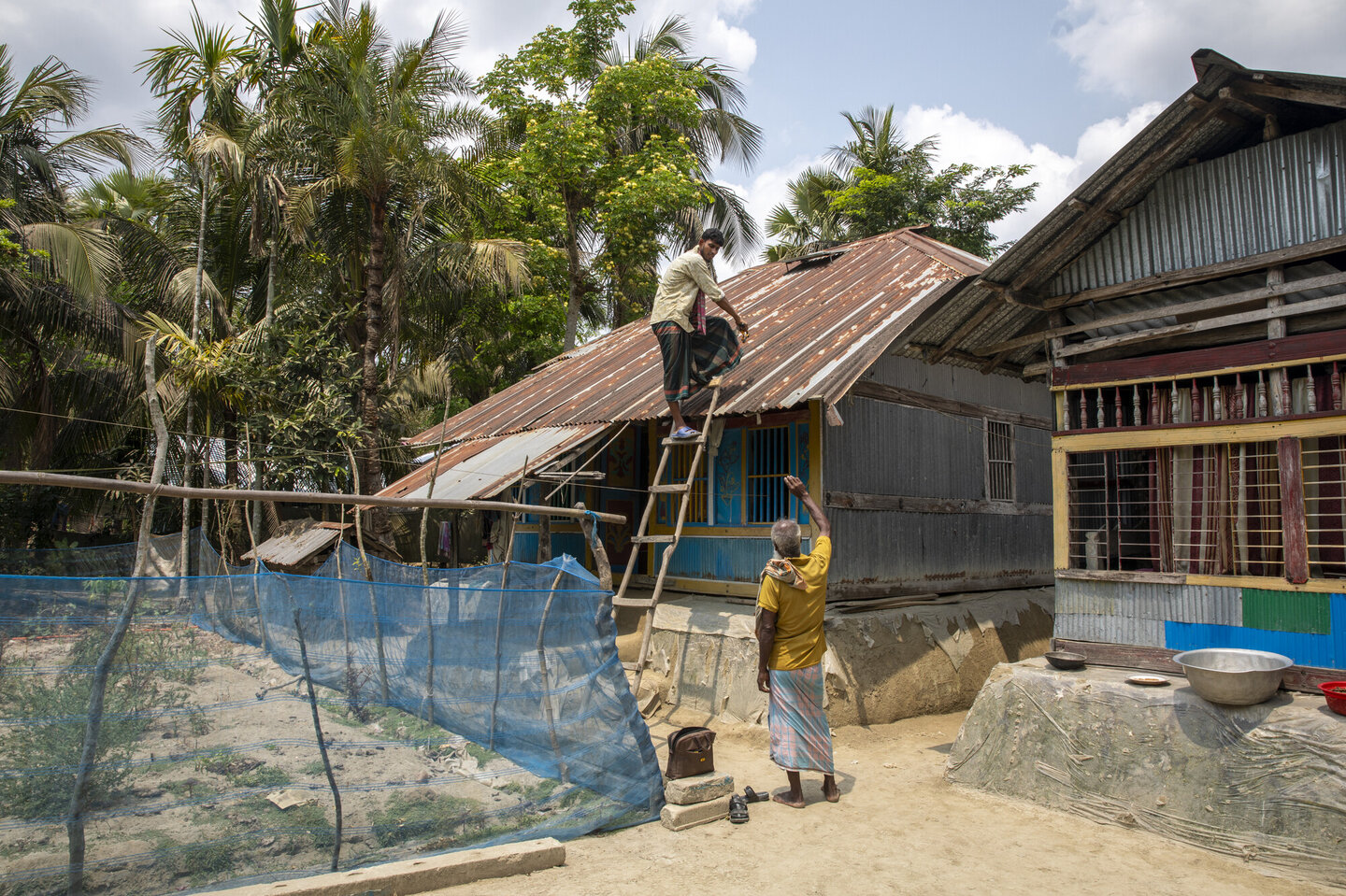
When farming becomes impossible
The salt has also rendered Mahabub's fields infertile. “I had to sell them off bit by bit,” says the 69-year-old as we sit in his simple wooden house under the fan powered by the solar panel on the roof. Mahabub looks sad.
“My family has always farmed here, and I would have liked to hand the fields over to my son Mehedi, but that is no longer possible.”
He knows exactly when the suffering began: It was in 2007, when Cyclone Sidr struck Bangladesh. Mehedi was eight years old at the time; he has only vague memories of the events. “Sidr took everything from us — our cows, our house,” says his father. The tropical cyclone was the most violent he had ever experienced. The wind carried a great deal of water from the sea inland; for weeks, it stood over a meter high. All the fields in the area — most of which are just above sea level — were flooded with seawater by Sidr.
“Nothing has been the same since,” he says. Now there are many more cyclones than before, at least one a year, and the saltwater whipped up by the storms often remains on the fields for weeks, and sometimes even months.
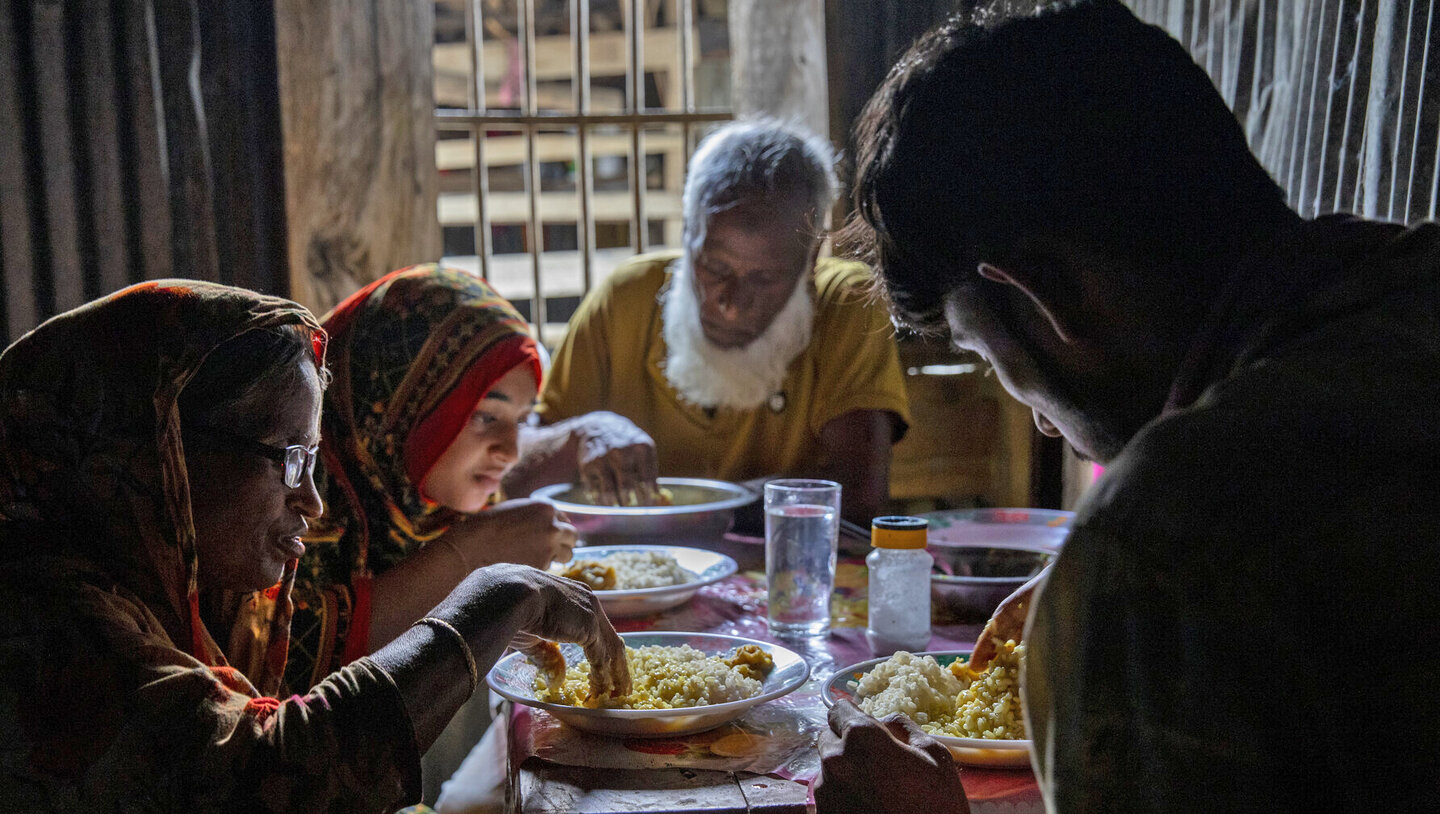
In search of alternatives
Mohammad Sanaul Islam confirms this observation. He is a professor of soil, water and the environment at the University of Khulna, about two and a half hours' drive north of Nishanbaria. I visit him in his office, where he explains the links between climate change and soil salinization. He says: “Until the middle of the last century, there were about four major storms a year in southwestern Bangladesh; now there are nine on average. This means that an area can be hit by cyclones several times a year.”
The flooding causes the salt content in the soil to rise significantly, and also fills the large ditches that farmers have dug as reservoirs for irrigating their fields with seawater instead of rainwater. Many farmers in the area have therefore made a virtue of necessity: They now breed marine animals in the ditches, which they can sell.
For Mahabub and his family, fish farming was not an option as an alternative to rice and grain cultivation. The investment costs would have been too high, says Mahabub, and the yield too small. However, it was also virtually impossible for Mahabub and his son to find other lucrative work in this predominantly agricultural area.
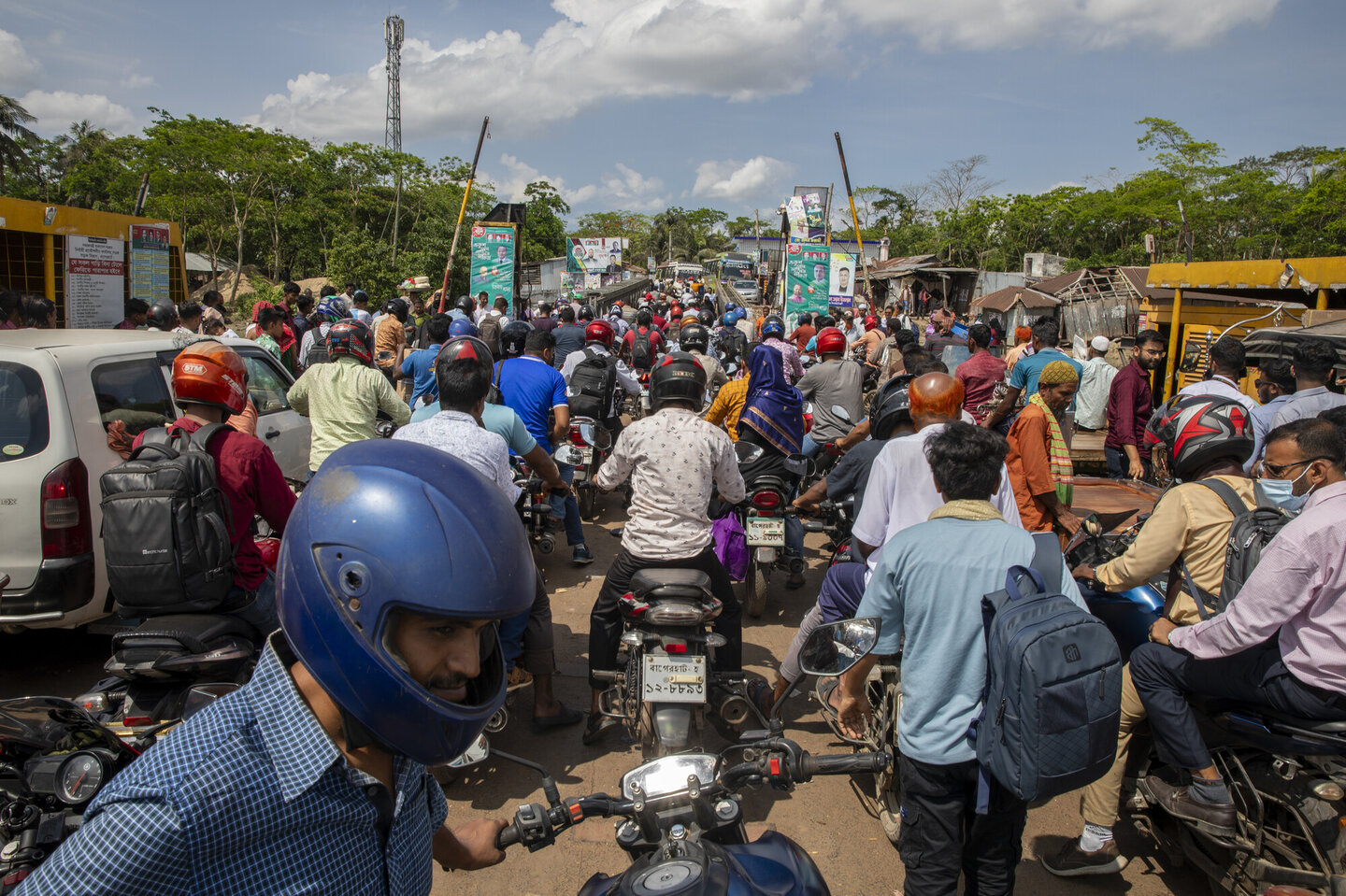
So Mehedi did what many young people in Bangladesh do when they no longer have any prospects at home: At just 18 years of age, he went to other parts of the country to look for work. Tradition in Bangladesh dictates that the eldest son must provide for his parents, and as the only son, this responsibility falls to Mehedi. This is a major challenge, especially now that the family no longer has any fields and therefore no source of income.
However, finding work is no easy task. Bangladesh has a population of 180 million, twenty times that of Switzerland, living in an area only about three and a half times the size. No other country in the world has such a high population density, and the struggle for food and jobs is correspondingly fierce. But Mehedi was lucky: He found work in construction in the big cities and was able to support his parents at home with his small income.
Mehedi Hasan
Advice for migrants
“None of these are permanent solutions,” says Sagor Mridha. He is the executive secretary of the Migration Hub, an advice center set up by Helvetas in Nishanbaria and other locations in Bangladesh for migrant workers like Mehedi. Here, these mostly young and often poorly educated or uneducated people receive support when they have to go to other parts of the country to look for work. “The problem is that the entire social structure collapses when a son leaves his parents' home and his village.”
The Migration Hub is housed in a small room in the center of Nishanbaria. Around a hundred people seek advice here every week. The volunteers who work here inform them about their rights and how to exercise them. They receive tips on dealing with authorities and employers, learn what to look out for in a contract, hear about job vacancies in Bangladesh, and, where possible, are put in touch with people from their area who have already found work. “But,” says Sagor, “above all, we try to discourage people from migrating. Because what happens if a parent falls ill or something happens to the children?”
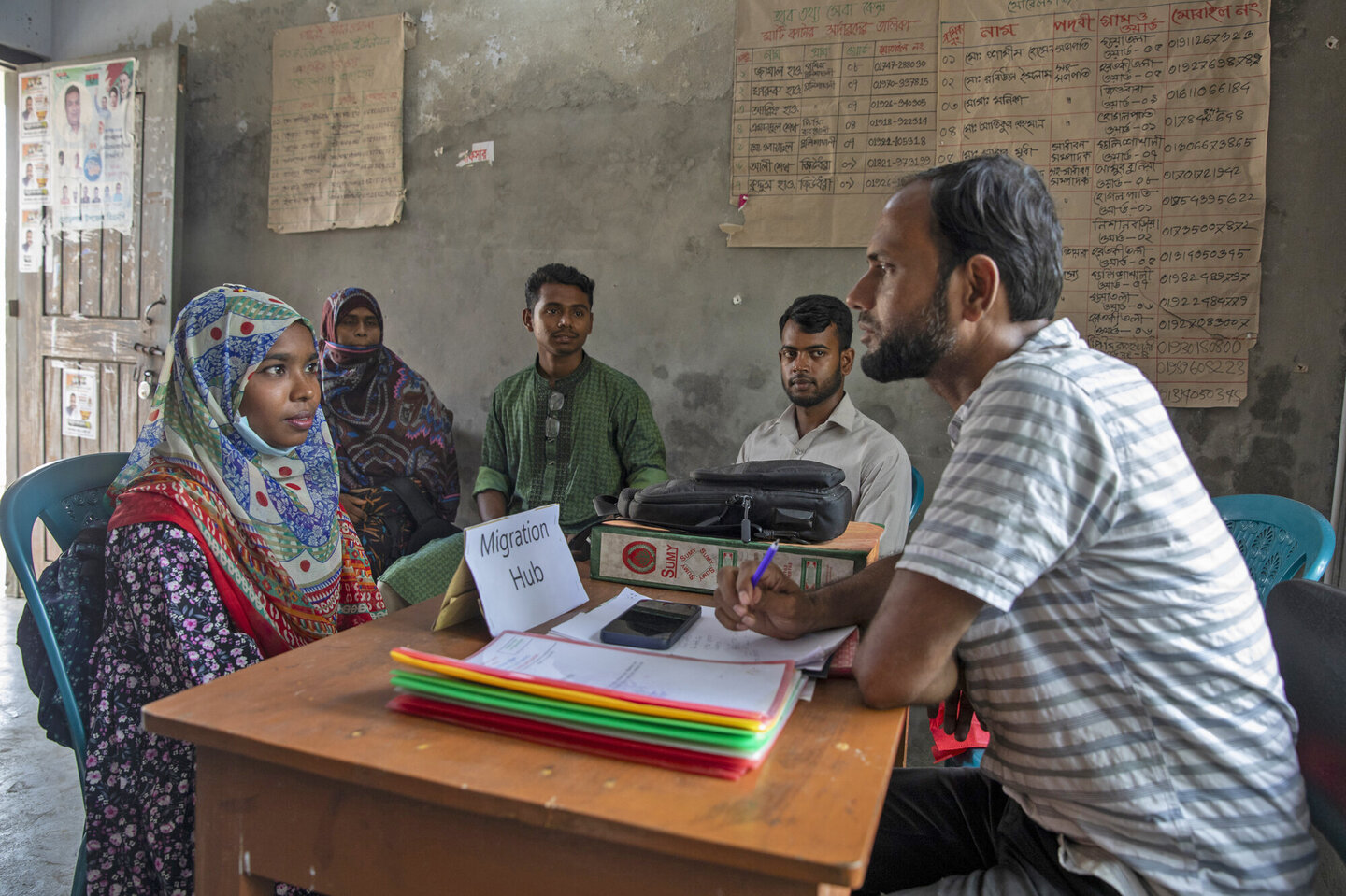
Prospects at home
When Helvetas set up the Migration Hub, the organization also introduced a Swiss-style apprenticeship program — something that was previously unknown in Bangladesh. The combined offering of practical vocational training in a company and theoretical knowledge transfer at school was designed to prepare people with limited basic qualifications for the domestic labor market.
This is how Mehedi, who has no school-leaving certificate, came to do an apprenticeship: The Migration Hub found him an apprenticeship in Solaiman Hawlader's electrical shop. The 40-year-old was once a migrant worker himself, having worked in South Africa for a few years in his mid-twenties. Once back in his homeland, he opened his own business.
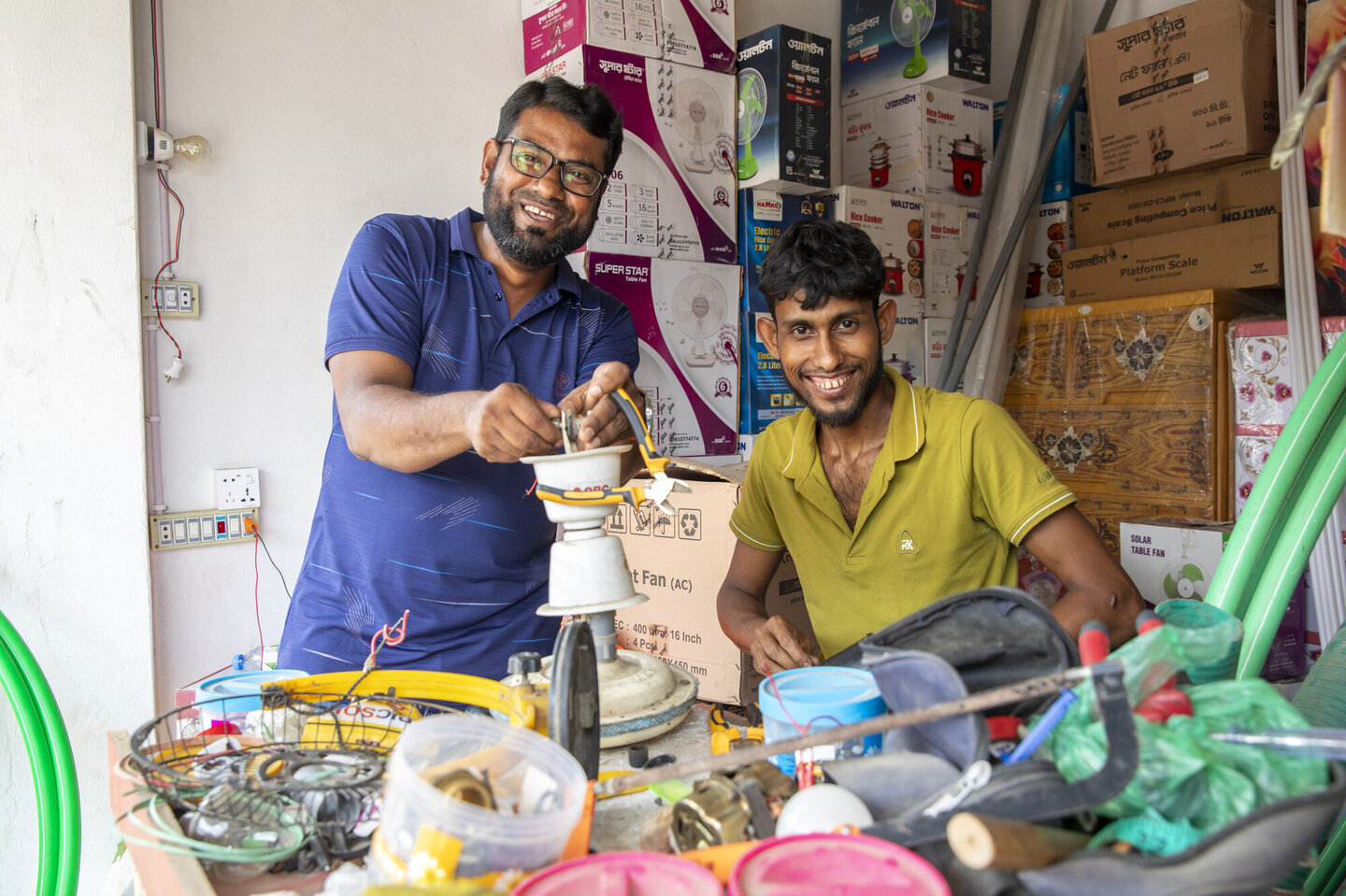
“Mehedi is a stroke of luck,” says Solaiman when I meet him in his shop. Electrical appliances are stacked up to the ceiling in the small workshop next to the shop. “He had already acquired a lot of knowledge about electrical engineering during the years he worked in construction.” Mehedi also thinks critically and constantly contributes his own ideas.
Solaiman kept Mehedi on after his training. Since there isn't the same amount of work every day, Solaiman keeps his young employee on call. “But there's almost always something to do,” says Mehedi's boss. “I'm glad I can call him anytime, for example, when someone brings in a broken mixer or fan and wants it repaired.”
And he has given him an additional task: For the past year, Mehedi has been responsible for mentoring the new apprentice, Nazul Islam. In this way, Mehedi passes on the knowledge he has acquired to another young person — and gives them the same prospects that he himself has been given.
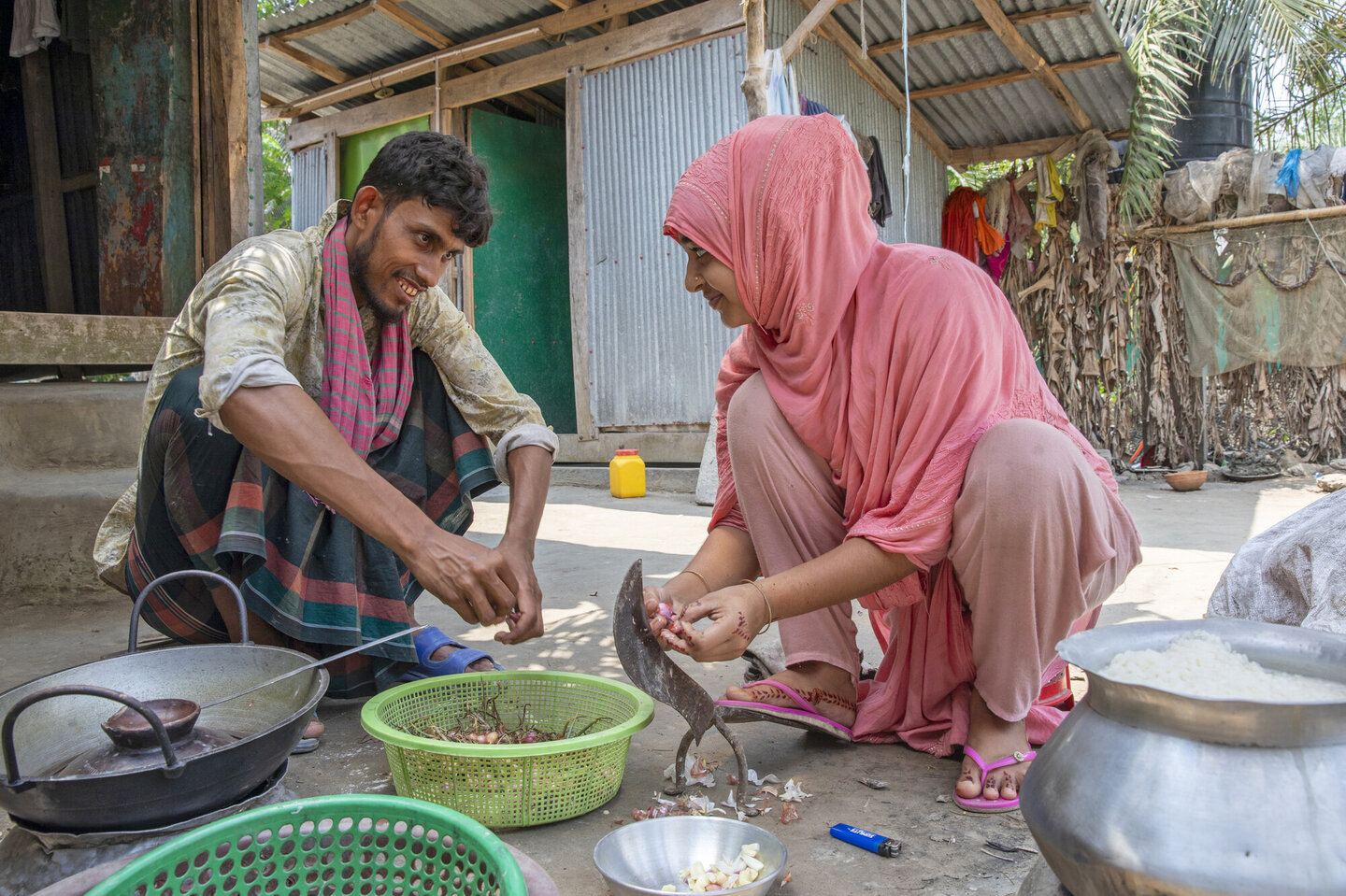
With his job at the electrical store and a few odd jobs, Mehedi earns a total monthly income of around 60 Swiss francs, which is about a quarter of the average wage in Bangladesh. He has to support his family on this. “It's not much,” he says, “but it's enough to live on.”
Mehedi sits down with his 22-year-old wife, Mitu Akhter, who is preparing lunch in the open kitchen behind the house, and helps her with the preparations. Today's menu is rice and potato balls with dal, the traditional lentil dish. If there is enough money, they occasionally have chicken. Mehedi looks at Mitu and says, “I am glad that I no longer have to travel to other parts of the country to work, and can now earn my money here at home.”
Bangladesh in Context: A Country in Transition
Bangladesh is one of the countries from which Switzerland plans to withdraw by 2028 in order to reduce its international cooperation spending. The country has indeed made promising progress: The decline in the birth rate from seven to two children per woman is just one example, and at the same time, an expression of profound social and economic changes. However, poverty remains high and is exacerbated by the climate crisis and its consequences. Helvetas has been working in Bangladesh for 25 years: Through important projects, the Swiss NGO is improving access to water and food security for children and pregnant women, supporting small farmers in adapting to the climate crisis, and encouraging women to run for political office in order to give them a voice in political processes.
Patrick Rohr is a freelance photojournalist and ambassador for Helvetas. In this role, he regularly visits Helvetas projects and reports on them not only in Helvetas publications, but also in articles for Swiss newspapers.


